Search
To search for an exact match, type the word or phrase you want in quotation marks.
A*DESK has been offering since 2002 contents about criticism and contemporary art. A*DESK has become consolidated thanks to all those who have believed in the project, all those who have followed us, debating, participating and collaborating. Many people have collaborated with A*DESK, and continue to do so. Their efforts, knowledge and belief in the project are what make it grow internationally. At A*DESK we have also generated work for over one hundred professionals in culture, from small collaborations with reviews and classes, to more prolonged and intense collaborations.
At A*DESK we believe in the need for free and universal access to culture and knowledge. We want to carry on being independent, remaining open to more ideas and opinions. If you believe in A*DESK, we need your backing to be able to continue. You can now participate in the project by supporting it. You can choose how much you want to contribute to the project.
You can decide how much you want to bring to the project.
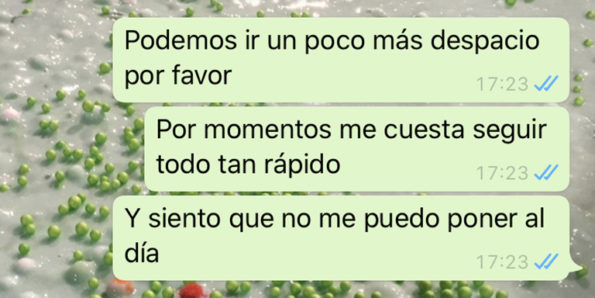
The austerity policies in public spending that were introduced in 2010 affected the resources available in the National Health Service (NHS). The austerity measures resulted in 5% pay cuts for the NHS staff, along with layoffs and a hiring freeze. During 2012 and 2013, the number of employees and salaries were further reduced and the working hours of the existing personal were increased. In 2017, the number of hospital beds in Spain was 297 per 100,000 inhabitants, while the average for the European Union is 340 beds per 100,000 inhabitants.
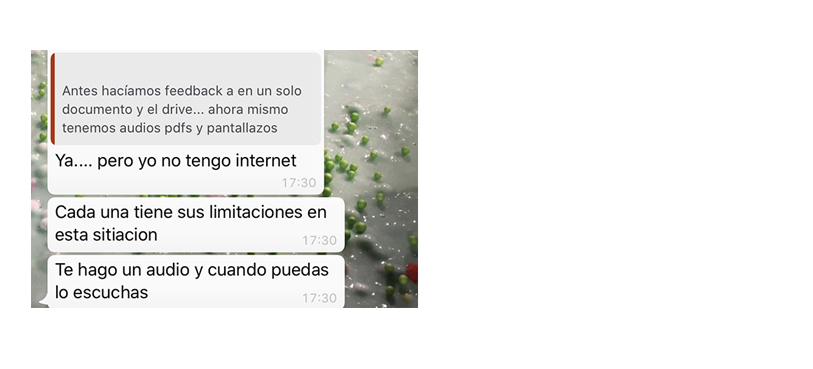
a: “We used to make the feedback in one single document and on Google Drive. Now we have audios, screenshots and PDFs”. b: “Yeah… but I don’t have Internet access. Each one has her own limitations in this situation. I’ll send you an audio, so listen to it when you can”.
Since 2012, Spain has also introduced the Royal Decree-Law 16/2012, which changed the basis of rights, binding them together to a person’s employment situation, thus eliminating “universal health care” and directly affecting thousands of migrants in a situation of social exclusion. Subsequently, the introduction of copayments and the cuts provided to health services have increased inequalities in health care for all people. Since 2019, 69% of Catalan hospitals are privately owned, as well as 56% of hospital beds.
The first patient in Spain with coronavirus was recorded on January 31, 2020. At this point, we are close to more than 249,000 cases in less than five months.
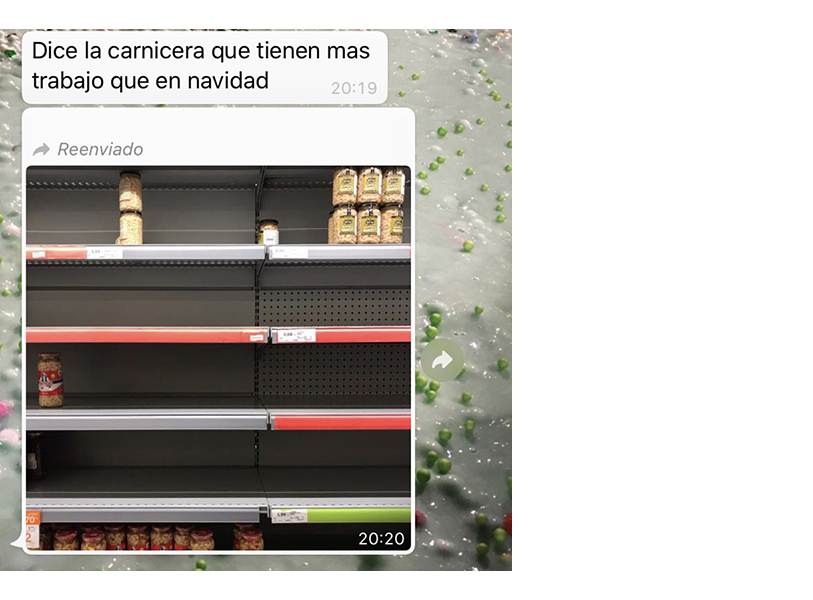
“The butcher says she has more work than at Christmas”.
The more population, the fewer beds, and the more privatization, the more privileged those beds become. With these facts, any virus that meets the vectors of contagion, morbidity and mortality, can once again overflow and collapse public health and, therefore, deny a large part of society its right to be cared for in fundamental conditions. In that case, it would be the collective reactions of resilience based on mutual support and care that would again become essential for the sustainability of life, understood as pluralistic, changeable and diverse.
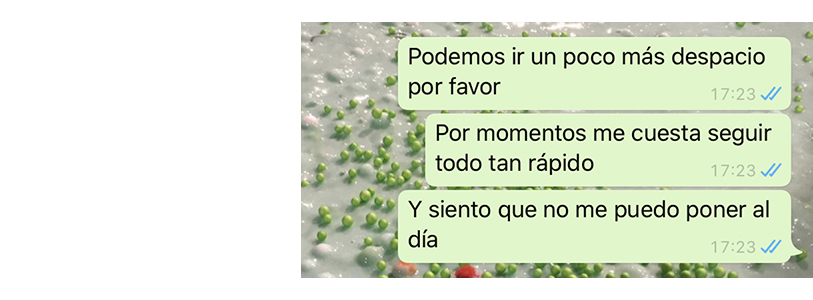
“Can we please go a little slower? At times I find it hard to follow everything so quickly. And I feel like I can’t catch up”
We can begin where we rarely begin: by saying that care work has historically reinforced the social subordination of the agents involved in it for gender, race, sexual orientation, ethnicity, social class, education, physical and/or mental disabilities and religion reasons. Also, if there is something that has demonstrated the strictest confinement, it is the domestic as something “naturalized”, the domestication of care and the private as the space from which life is, in most cases, managed obeying the ideology and structure of the nuclear family. Furthermore, we have witnessed a relationship between military strategy and care that can easily tend to promote relational forms that stand up for sovereignty and private establishment, rather than emancipation and common care. A relationship that would be bound to a particular sense of protection that, rather than taking the needs of the other person as a starting point, “assumes that the protector knows best” what the person[1]Understood as the model subject of capitalism: cis-white-heteronormative being cared for needs.
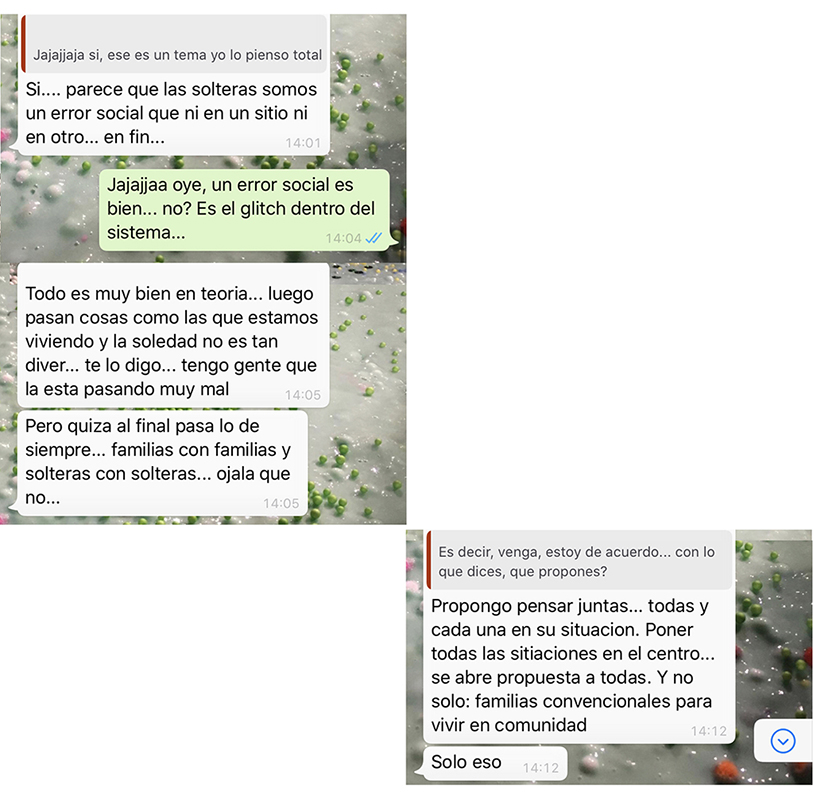
a: “Yes, I think about that a lot”. | b: “It seems that we, single women, are a social mistake… that we fit nowhere… anyway…”. | a: Haha, hey, a social mistake is fine, isn’t it? A glitch within the system…”. | b: Everything is fine on paper… then things like the ones we are living through happen and loneliness is not such a fun thing… I tell you… I know people who are having a bad time, but maybe, in the end, the usual thing happens: families with families, single women with single women… Hopefully not… c: “I mean, okay, I agree with what you’re saying. What do you propose?” | b: I propose to think together… each and every one of us in our own situation. Putting all situations in the center… a proposal is opened for each one of us. And not only conventional families to live in community. That’s all”.
As Mark Fisher says, one of the main institutions that defends care from a rhetoric of protection in the public sphere is, precisely, the military, and we have well seen that the military has been and still is very present in the management of the COVID-19 crisis. We refer here to Joan Tronto (one of the greatest exponents of the ethics of care), who finds the relation between care and protection so problematic that he excludes it from any kind of care category.
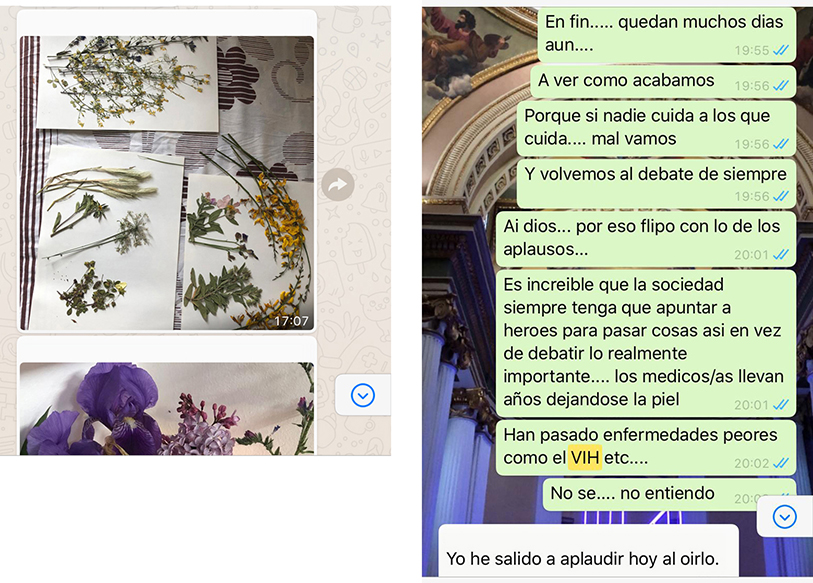
a: “Anyway… there are still many days left. Let’s see how we end up, because if no one takes care of those who take care of us, bad thing… and we’re back to the usual debate. Gosh, that’s why I freak out about the applauses… It’s incredible how society always aims at heroes to get things done instead of debating what’s really important: doctors that have been busting their asses for years. They have been fighting against worse diseases like HIV and so on… I just don’t understand it…”. | b: “I applauded today when I heard it…”
During the “confinement”, the media and social networks tirelessly repeated the idea of “heroism” of health workers, alluding to a romantic idea of vocation that is external to the precarious conditions, the temporary contracts and the physical and emotional vulnerability to which they are exposed. We all attended this “show”, applauding punctually at eight o’clock every evening.
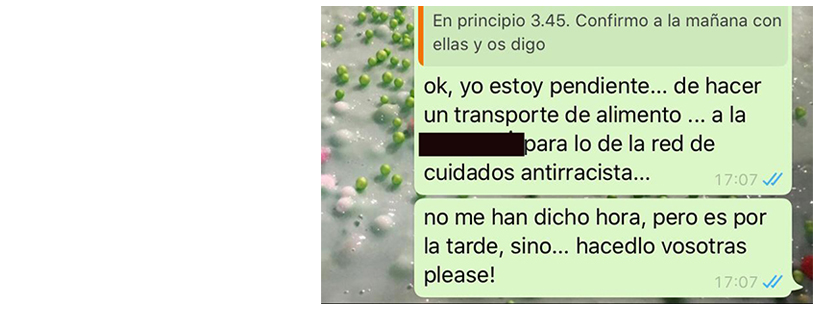
a: “Ok, I’m waiting to transport food to the (…) for the anti-racist care network… They didn’t say what time it will be, but it’s in the afternoon. If I can’t, you do it, please!”.
Another success of the mainstream tale is the stories of neighbors who help each other “by keeping social distance”, who sing from balconies and who entertain themselves by watching at key people in the state of alarm: police officers and firefighters who collect food and sing “happy birthday” to white children. “Menas”[2]Acronym for “foreign unaccompanied minors”, usually used in Spain by the media, institutions and political parties, among others, to depersonalize first and then criminalize those who are most … Continue reading do not have a birthday, and there is not much talk about the informal networks[3]We have here in mind examples such as the Red de Cuidados Antirracista (Anti-Racist Care Network): https://redantirracistacuidados.wordpress.com/, but also of many others. that are organized to gather and distribute essential resources for those who do not appear in the media because they are not visible to the system.

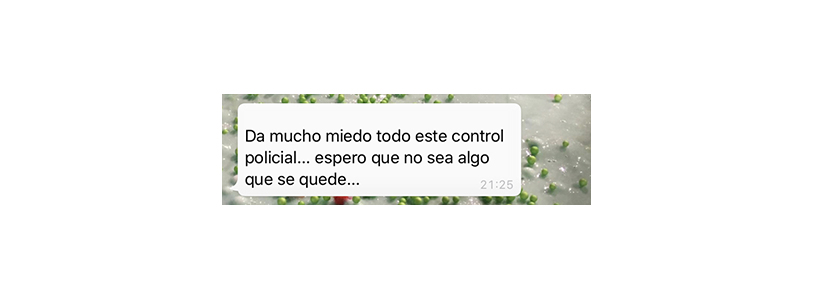
a: “By the way, are there a lot of cops on the street? I’m thinking of watering my plants tomorrow, get something and come back… by train”. | b: You can carry some shopping bag and nobody will tell you anything, I don’t know… I haven’t been out for days… Today I went out to buy and there were cops, but they didn’t tell me anything; they just addressed to me when I stopped to talk to the neighbor. All this police control is very scary… I hope it won’t last forever…”
The criminalization during the state of alarm of the displacements for food provisions and the care of vulnerable and dependent people but, above all, of non-regulatory subjects among others, shows the interest of government institutions in subjecting to punishment other forms of life support that are not those constituted from the militarist protection. In this regard, we must be aware that the path towards other forms of care capable of sustaining the diversity of lives that inhabit out neighborhoods, cities, towns or communities in the present times is neither easy, homogenizing nor confrontation-free task among the agents involved or with ourselves. However, what some may see as ineffective symbols is actually taken very seriously by the police or the military, who will move quickly and energetically to stop them.
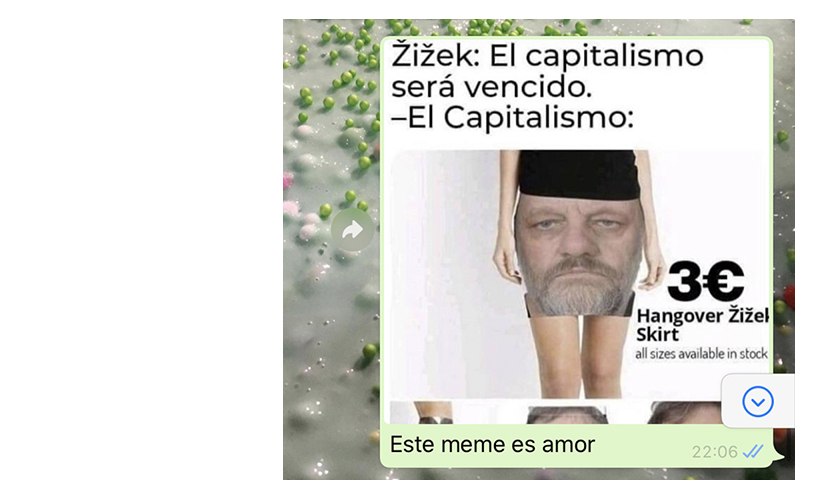
a: “I love this meme”.
As we said at the beginning, if the privatization of life-supporting structures and the precariousness to which they are subjected have placed the urgency and the indispensability of mutual support structures in the spotlight in order to cope with the sustainability of our lives in the face of a pandemic, it is now more urgent than ever to continue to collectivize all the experiences lived these last months, as well as those that precede us. In this way, we will be able to map and detect the tools needed to ensure sustainable forms of care in line with the ways of life that we decide on together. Therefore, our greatest challenge is to be able to create a careful, safe, transversal and intersectional space in which, from our diversity of voices and bodies, we can continue to build together, migrating knowledge and conceiving responsible and attentive forms of support to the diversities that characterize us.
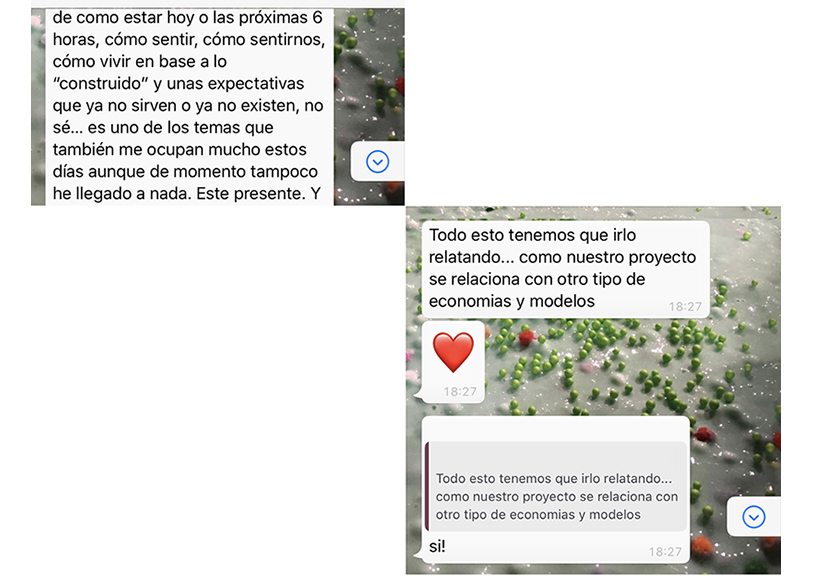
b: “(…) how to be today or the next six hours, how to feel, how to feel about ourselves, how to live based on what is “built”, and with some expectations that are no longer useful or don’t exist anymore… I don’t know… This is also one of the topics that I spend a lot thinking about these days… Although for the moment I’ve gotten nowhere (…)”. c: “We have to tell all this… How our project relates to other types of economies and models…”.
*This writing puts together an opinion text with extracts from our conversations on WhatsApp, intertwining the different layers that go through the act and the writing times with the specific assignment. As Sara Ahmed says, it is the idea of “working very hard on a text”, giving visibility to the (collective) effort and the personal dimensions (which are also political) of the act itself.
| ↑1 | Understood as the model subject of capitalism: cis-white-heteronormative |
|---|---|
| ↑2 | Acronym for “foreign unaccompanied minors”, usually used in Spain by the media, institutions and political parties, among others, to depersonalize first and then criminalize those who are most vulnerable and should be protected under the “Declaration of the Rights of the Child”. |
| ↑3 | We have here in mind examples such as the Red de Cuidados Antirracista (Anti-Racist Care Network): https://redantirracistacuidados.wordpress.com/, but also of many others. |

Larre is a feminist and intersectional force that uses and facilitates tools of thought and action with which to find a common and plural terrain from which to point out, question and reconstruct theories and practices in today’s cultural sector. Occupying different places and bodies in criticism, practice and research, we propose and welcome collaborative activities and spaces capable of embarking on the exploration of different realities that are normally invisible or submerged. Larre is composed by Lara García Díaz, Priscila Clementti and Ángela Palacios.
Larre is currently developing the project “Careful. Tools for collective articulation”. For more info: tencuidado.org
"A desk is a dangerous place from which to watch the world" (John Le Carré)